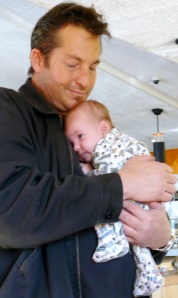 A good, and widely traveled, friend emailed me in response to “Where are my dudes?” to concur that in other cultures affection amongst friends, men as well as women, is more accepted and widespread—and really important for us humans to feel connected, loved and less alienated. While kids are more huggy these days than when I was growing up, it’s never too late to get more affectionate.
A good, and widely traveled, friend emailed me in response to “Where are my dudes?” to concur that in other cultures affection amongst friends, men as well as women, is more accepted and widespread—and really important for us humans to feel connected, loved and less alienated. While kids are more huggy these days than when I was growing up, it’s never too late to get more affectionate.
A recent NY Times piece about Touch takes a scientific look at how touch, even small gestures like a warm hand on the shoulder, makes a big difference in how we feel and behave.
Research shows that kids are more likely to volunteer for things if the teacher has given them a supportive touch on the back or arm. A study of pro basketball and touch finds that the best teams are also the most touchy-feely.
Warm touch reduces stress by lowering cortisol levels (which can, over time, lead to heart disease, obesity, and is consistent with reduced immune functioning) and it also seems to release trust-enhancing hormones, building bonds, lowering depression and facilitating well-being.
Touch helps chill out the brain’s prefrontal areas, which help regulate (the opposite of the soon to be pervasive “dysregulation” as key problem) emotion; this makes the brain better able to problem solve, but this area is also in charge of things like appreciating music and intuitively connecting with others—things that make life sweet.
Given that the body seems to interpret supportive touch to mean, “I’m in it with you,” keeping touch in mind as a parenting staple (particularly if snarling and reticent teens have made themselves a little bit untouchable lately) seems like both common sense and a sensible, science-based, way to enhance our relationships with our children at any age, to communicate support and build a feeling of team amongst family.
Further to the importance of touch, one psychologist, James A. Coan, was quoted as saying, “We think that humans build relationships precisely for this reason, to distribute problem solving across brains. We are wired to literally share the processing load, and this is the signal we’re getting when we receive support through touch.”
So, virtual warm hands on shoulders, pats on backs and hugs of love and support all around here in cyberspace… in support of real touch, warmly delivered, to friends and family… and especially to our children—ultimately in the service of all our collective children.
Namaste, Bruce



{ 1 comment… read it below or add one }
I finished my job last night and there were lots of hugs that went around. It was a reminder of how lovely it feels to extend and receive that warmth authentically. Granted, these were people that I have enjoyed working with, but the added hug of farewell sealed the experience for me. Four months ago I did not know these people and last night they were my family.
{ 1 trackback }